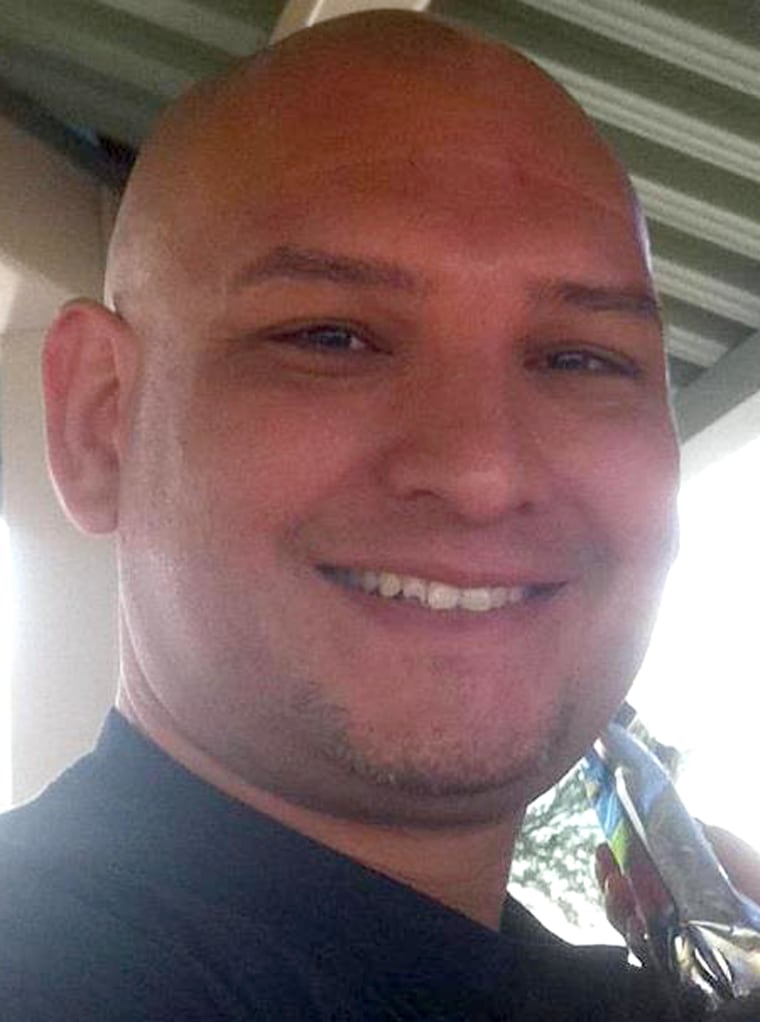PHOENIX — Inside the modest home belonging to a suicidal Maricopa County Sheriff’s deputy, investigators said they found a stash of evidence that was never turned over to the department: drugs, hundreds of fake IDs, personal information from drivers with Hispanic surnames and 900 hours of videotaped traffic stops.
Exactly why 40-year-old former deputy Ramon “Charley” Armendariz, who was found dead May 8 from an apparent hanging, amassed the collection remains a mystery. His sudden suicide has left loved ones who knew him as a man who proudly wore the uniform grappling with a motive.
“This is all a shocker to us,” Armendariz’s cousin, Jennifer Canalda Talamantes, told NBC News on Monday. “There’s no closure, and it’s been very hard on everyone in the family.”
While investigators try to unravel the bizarre actions that preceded Armendariz’s death, what he left behind could have implications for one person in particular — his former boss, controversial Arizona Sheriff Joe Arpaio.
The videos of the traffic stops, apparently taken from cameras mounted on Armendariz’s eyeglasses and dashboard, were supposed to be turned over in the racial profiling cases against Arpaio, the tough-talking Maricopa County Sheriff who has been accused of targeting Latino immigrants.
But for reasons still unknown, those videos were stored in Armendariz’s Phoenix home.

“It’s so far beyond the pale of behavior,” Daniel Pochoda, legal director of the American Civil Liberties Union Foundation of Arizona, said of the privately hoarded evidence.
“Whether or not this was [Armendariz's] own particular MO — which is obviously not proper and not legal — he had what appears to be significant evidence taken from people who were stopped,” Pochoda said.
The ACLU said it was provided more information Friday into the federal monitor’s investigation of the Maricopa County Sheriff’s Office. The monitor was given oversight last year of the department after a judge found Latino drivers were being stopped as part of the sheriff’s crackdown on illegal immigration.
The Justice Department has an ongoing lawsuit against the agency alleging racial profiling.
If anything, Pochoda said, the videos will help make the case “stronger” against the sheriff’s office.
Arpaio’s lawyer says the agency hopes Armendariz was a rogue officer. “I don’t know what triggered him,” said Arpaio, whose territory includes the Phoenix area.
Armendariz moved to Arizona from El Paso, Texas, in 2004 to be closer to two terminally ill relatives. First a jail officer, he became a deputy and eventually joined the smuggling squad that was once the flagship of Arpaio’s immigration crackdowns.
“There’s no closure, and it’s been very hard on everyone in the family.”
As a member of the unit for about four years, the deputy was among dozens of officers who received special training to enforce federal immigration laws. He also took part in Arpaio’s most controversial patrols.
The deputies would flood an area — in some cases, heavily Latino areas — over several days to seek out traffic violators and arrest other offenders.
Arpaio’s office was sued over allegations that officers systematically racially profiled Latinos, and went on trial over the accusations. Armendariz was a witness, testifying that he never used race as a factor in making a traffic stop.
U.S. District Judge Murray Snow later ruled Arpaio's deputies — including Armendariz — had in fact racially profiled Latinos and implemented a series of remedies, including appointing a federal monitor to help carry out the reforms.

Armendariz had other issues during his tenure.
Job evaluations obtained by The Associated Press through a public records request documented a flaw in his police work that later emerged — that he had a problem turning in reports. At his house, officers found criminal citations that he wrote but were never prosecuted because he didn’t turn in paperwork.
He was still a proud deputy, and on the surface, was an outgoing guy who never publicly expressed negative feelings about immigrants.
His cousin, Canalda Talamantes, said Armendariz understood discrimination because he was gay, and had to learn to take care of himself after his mom threw him out of the house and his father disowned him when he revealed his sexual orientation.
He lived with his partner in Phoenix, and was recently going through a rough patch in their relationship, his family and neighbors said. His life took an uncharacteristic turn on May 1, when the barrel-chested Armendariz, wearing only his boxer shorts, began firing a pepper ball gun at an imaginary burglar in his garage.
Police believe he was either high on drugs or having a manic episode. Investigators found what they believed to be marijuana, methamphetamines, cocaine and LSD in the home.
Neighbors said they never knew Armendariz to take drugs, but that he admitted to confiscating them from kids in the area so that he could teach them a lesson without arresting them.
“Whether or not this was his own particular MO ... he had what appears to be significant evidence taken from people who were stopped.”
Police arrested Armendariz after his odd behavior in his garage, and during a 90-minute interview, he quit his job.
Three days later, officers rushed to his home when he barricaded himself inside during a nine-hour standoff. It ended peacefully, but during a search of the house, investigators found the drugs, case files, IDs and the traffic-stop videotapes.
He was jailed on drug charges and released on the condition that he wear an electronic monitor — but he failed to retrieve the device the next day. When officers arrived May 8, they said they discovered him dead from an apparent suicide.
Those who knew him are unable to reconcile the person he had become and the man who loved life and would eagerly decorate his home each Christmas.
“He had the biggest marshmallow heart in the world,” neighbor Joanne Baughman told NBC News.
“The person who I saw and what I am reading is night and day,” added another neighbor, Lori Connolly-Sargent.
Armendariz was so beloved that neighbors set up a shrine outside of his home after he died. His body was cremated in El Paso, his family said.
Baughman added: “To know Charley was to love him. A good, good person.”
Rich Dubek reported from Phoenix, and Erik Ortiz reported from New York. The Associated Press contributed to this report.
